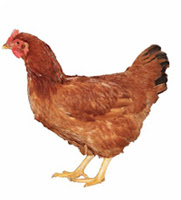Essential Nutrients For Poultry
This article mainly consider mineral and vitamins as the essential nutrients for poultry. In the context of nutrition, a mineral is a chemical element required as an essential nutrient by organisms to perform functions necessary for life. Minerals originate in the earth and cannot be made by living organisms while Wikipedia defines a vitamin as an organic molecule (or related set of molecules) which is an essential micronutrient. That is, a substance which an organism needs in small quantities for the proper functioning of its metabolism but cannot synthesize, either at all or in sufficient quantities, and therefore must obtain through its diet.
One of the major problem related to domestic and commercial poultry farming is poor or inadequate feeding programme which results to vitamin and mineral deficiencies for the birds. This leads to deficiency diseases, especially when formulated feed are not used.
Minerals
Minerals are important to the growth, development and overall health of poultry. The followings are some of the important minerals and symptoms of mineral deficiencies:
Calcium: Poor egg shell quality and poor hatchability, rickets
Phosphorus: Rickets, poor egg shell quality and hatchability
Magnesium: Sudden death
Manganese: Perosis, poor hatchability
Iron: Anaemia
Copper: Anaemia
Iodine: Goitre
Zinc: Poor feathering, short bones
Cobalt: Slow growth, mortality, reduced hatchability
Poultry also require all known vitamins except vitamin C. The two classes of vitamins are water-soluble vitamin and fat-soluble vitamin. Some of the symptoms of a vitamin deficiency are as follows:
i) Fat Soluble Vitamins
Vitamin A: Decreased egg production, weakness and lack of growth
Vitamin D: Thin shelled eggs, reduced egg production, retarded growth, rickets
Vitamin E: Enlarged hocks, encephalomalacia (crazy chick disease)
Vitamin K: Prolonged blood clotting, intramuscular bleeding
ii) Water Soluble Vitamins
Thiamine (B1): Loss of appetite and death
Riboflavin (B2): Curly-toe paralysis, poor growth and poor egg production
Pantothenic Acid: Dermatitis and lesions on mouth and feet
Niacin: Bowed legs, inflammation of tongue and mouth cavity
Choline: Poor growth, fatty liver, decreased egg production
Vitamin B12: Anaemia, poor growth, embryonic mortality
Folic Acid: Poor growth, anaemia, poor feathering and egg production
Biotin: Dermatitis on feet and around eyes and beak
As indicated above, vitamin and mineral deficiencies can produce numerous health problems for chickens including in some cases, death. Thus, to prevent nutritional deficiencies, or when deficiency symptoms are noted, feeding a balanced poultry diet with the required vitamins and minerals should be practised; meaning that using aggregate quantity of a nutrient will prevent its deficiencies. In other way round, you can just add vitamin/mineral premix to your poultry feed if you notice any vitamin deficiency. Read more about Poultry Feed.
For quick updates and comments, follow us on our social media connects; FacebookPage, TwitterHandle and Instagram. You can also subscribe and watch videos on our YouTube channel. At Artib Farm, we materialize your satisfaction!
Cited work
Achieving maximum health and performance of poultry requires nutritionally balanced diets, writes Dan L. Cunningham, Extension Coordinator at the University of Georgia.





Comments
Post a Comment